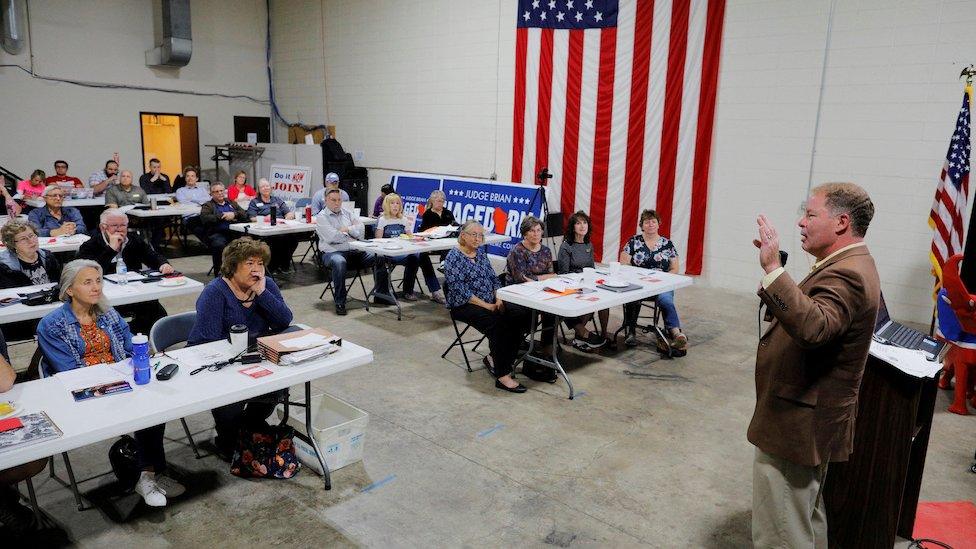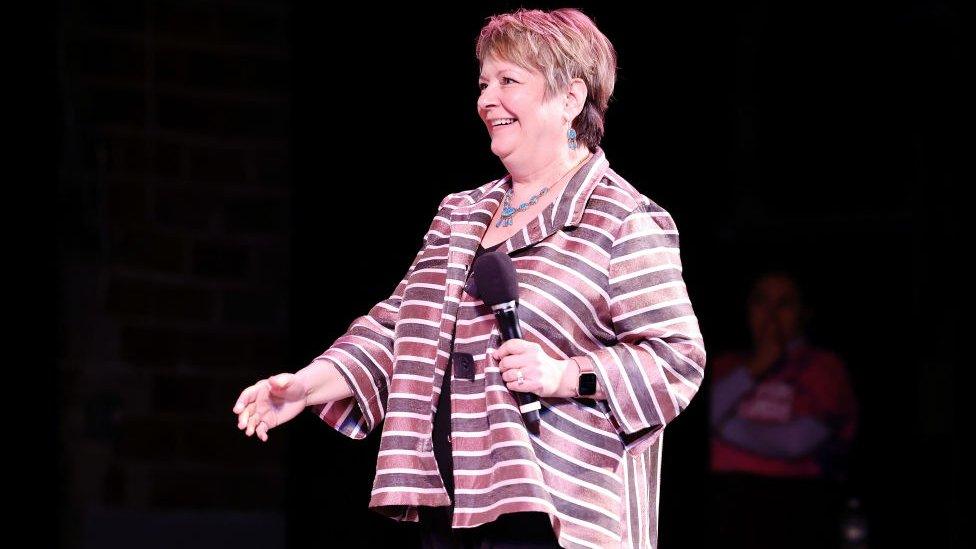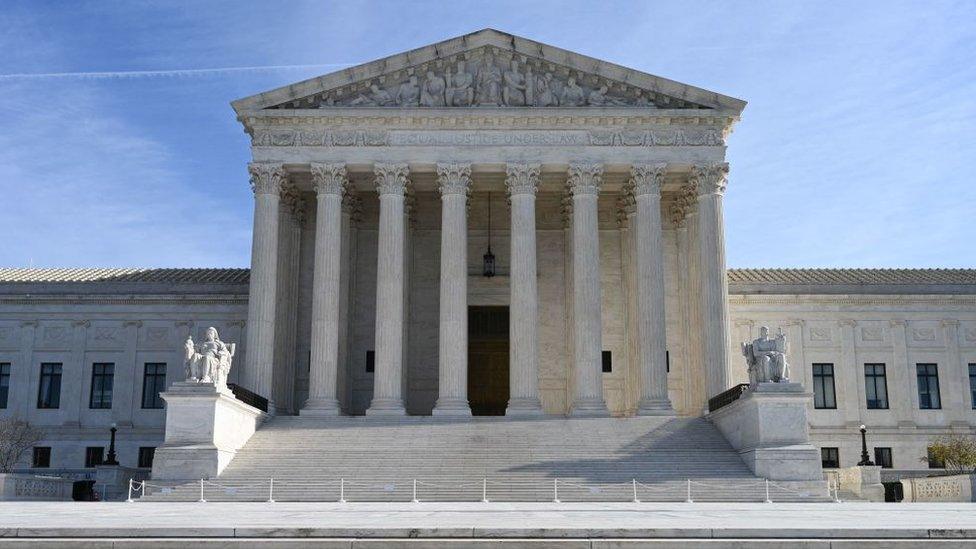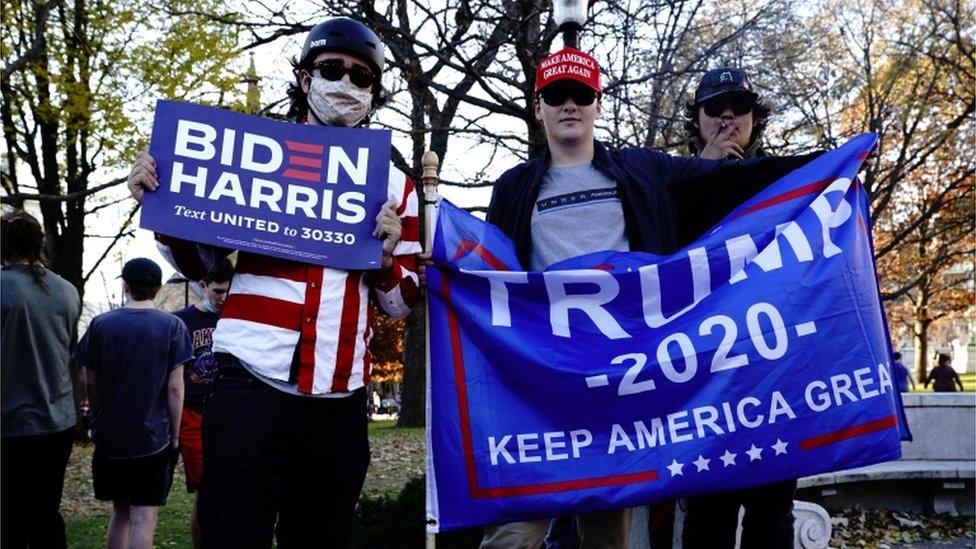Why the Wisconsin Supreme Court election matters
- Published

Daniel Kelly is the conservative candidate hoping to join Wisconsin's Supreme Court
Millions of dollars are flooding into Tuesday's race to elect a judge in Wisconsin. Why has an election for a supposedly independent position become such a bitter political battle?
This is the most expensive court race in US history, but there's more at stake than just $40m: whoever wins a spot on Wisconsin's Supreme Court could tip the scales on some of America's most pressing issues.
The state's top court has the final say on what laws go into effect, and is currently equally split between three liberal and three conservative candidates.
The side that wins a majority will determine the fate of key issues including access to abortion and voting rights in the state.
The court could also be called to decide on any challenges to the 2024 US presidential election results. In 2020, a single vote by a justice blocked an effort by then-President Donald Trump and his allies to overturn his defeat in the swing state.
"That majority on the court has more power than the governor, more power than the assembly or the senate," Brian Schimming, the Chairman of Wisconsin's Republican Party, told the BBC.
That's why unprecedented attention - and campaign spending - is focused on the 4 April run-off between Judge Janet Protasiewicz, the liberal candidate, and Justice Daniel Kelly, her conservative opponent.
The result of the race may be clear by Tuesday evening.
'The most expensive court race ever'
The Wisconsin race has cost nearly $42.3m (£34m), according to campaign finance watchdog Wisconsin Democracy Campaign, triple the previous national record.
Since 20 March, when they had to start mandatory disclosures, Ms Protasiewicz's campaign has spent just shy of $12m, while her opponent Mr Kelly's campaign has spent a little more than $2.2m. But it was third-party organisations whose spending on things like advertisements tipped this race into overdrive, with $15.3m spent for Mr Kelly, and $11.3m for Ms Protasiewicz.
Democratic and Republican parties have been their biggest contributors, as well as interest groups and wealthy political donors from both sides.
Matt Rothschild, executive director of the Wisconsin Democracy Campaign, said changes to election laws have allowed people from outside the state to spend unlimited amounts on campaigns.
"In a real democracy, we shouldn't have a tug of war between a handful of billionaires on the left and a handful of billionaires on the right," he said.
Judicial elections are the norm for state courts in the United States. According to the National Center on State Courts, external, nearly 90% of all state judges are elected, either to win their initial seat or to be re-elected. In Wisconsin, the supreme court election is technically meant to be non-partisan. Both candidates insist they will remain independent during their 10-year term and simply follow the law. But on a host of hot-button issues, the battle lines are clearly drawn.
"In a polarised political climate, leaning into salient wedge issues can be an effective way for candidates to generate attention and support - including financial support," said Professor Robert Yablon, from the University of Wisconsin Law School.
"The old expression that 'all politics is local' increasingly seems to have it backwards: today, even local elections often become nationalised," he added.
The battle over abortion rights
After the US Supreme Court overturned Roe v Wade in June 2022, ending the nationally protected right to abortion, laws surrounding the procedure fell to individual states.
In Wisconsin, this meant a law from 1849 came back into force. One of the strictest in the country, it bans abortion in nearly all cases, the only exception being to save the life of the mother.
Judge Protasiewicz has put the effort to overturn that law at the forefront of her campaign.

Judge Janet Protasiewicz is the liberal candidate for Wisconsin's Supreme Court
In her primary night victory speech, she took aim at her conservative rival: "I'll be running against someone who doesn't think that women get to make their own reproductive choices. I will guarantee you that my opponent, if elected, will uphold the 1849 ban."
Justice Kelly told the BBC he believes his views on abortion are irrelevant because he'll stay "consistent to the constitution" when ruling on laws. He accuses Judge Protasiewicz of behaving more like a political candidate than a judicial one.
Justice Kelly has accepted the endorsement of three prominent anti-abortion groups - and has benefited from the influx of cash from conservative national organisations too.
Judge Protasiewicz defended being outspoken about her values.
"People deserve to know that, rather than having this shady division of standing up and telling people you're going to follow the law, and not giving them any insights into how you think and feel. It really doesn't tell the voters much, it's almost a charade."
Related topics
- Published7 December 2022

- Published19 November 2020
